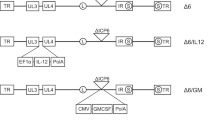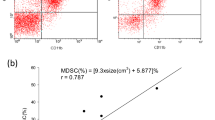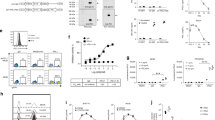Abstract
The use of prodrug-activated (“suicide”) gene therapy has been shown to be effective in inducing tumor regression when only a small proportion of tumor cells contains the suicide gene. These experiments were designed to test whether additional therapeutic benefit may be obtained by stimulating the immune response. Murine MC26 colon carcinoma cells, either untransduced or transduced with genes for herpes simplex virus-1 thymidine kinase (HSV1-TK) or human GM-CSF, were injected subcutaneously into syngeneic BALB/c mice in various combinations. Inoculation of equal numbers of untransduced and HSV1-TK–containing cells followed by ganciclovir (GCV) treatment resulted in almost complete tumor regression, but by 7 weeks, tumors had recurred in all mice. A similar initial regression was obtained using equal numbers of cells containing HSV1-TK and GM-CSF genes, but >80% of these mice remained tumor-free after 3 months. Groups of tumor-free mice that had received GM-CSF–containing cells were left for different periods of time and rechallenged with unmodified MC26 cells on the opposite flank. Of the mice rechallenged 14, 28, and 108 days later, 100%, 88%, and 57%, respectively, showed complete resistance to unmodified tumor cells. In mice that showed tumor regrowth, tumor volume was much less than in control mice. Adoptive transfer of spleen cells from resistant mice to naı¨ve syngeneic mice resulted in partial resistance to challenge with unmodified tumor cells. Specific cytotoxicity against MC26 cells was only demonstrable in mice receiving GM-CSF– and HSV1-TK–containing tumor cells. These experiments show that the presence of cells secreting GM-CSF in HSV1-TK–containing, regressing tumor is able to induce complete or partial resistance to tumor rechallenge. This indicates the potential usefulness of GM-CSF in enhancing other antitumor therapies. Cancer Gene Therapy (2000) 7, 1519–1528.
This is a preview of subscription content, access via your institution
Access options
Subscribe to this journal
Receive 12 print issues and online access
$259.00 per year
only $21.58 per issue
Buy this article
- Purchase on Springer Link
- Instant access to full article PDF
Prices may be subject to local taxes which are calculated during checkout
Similar content being viewed by others
Author information
Authors and Affiliations
Corresponding author
Rights and permissions
About this article
Cite this article
Jones, R., Pope, I., Kinsella, A. et al. Combined suicide and granulocyte–macrophage colony-stimulating factor gene therapy induces complete tumor regression and generates antitumor immunity. Cancer Gene Ther 7, 1519–1528 (2000). https://doi.org/10.1038/sj.cgt.7700259
Received:
Accepted:
Published:
Issue Date:
DOI: https://doi.org/10.1038/sj.cgt.7700259
Keywords
This article is cited by
-
Therapeutic properties of a vector carrying the HSV thymidine kinase and GM-CSF genes and delivered as a complex with a cationic copolymer
Journal of Translational Medicine (2015)
-
Antitumor immune responses mediated by adenoviral GDEPT using nitroreductase/CB1954 is enhanced by high-level coexpression of heat shock protein 70
Cancer Gene Therapy (2005)
-
Enhanced efficiency and specificity of ovarian cancer gene therapy in rats with a novel nonviral gene delivery system (GE7) via intraovarian artery perfusion approach
Cancer Gene Therapy (2005)



